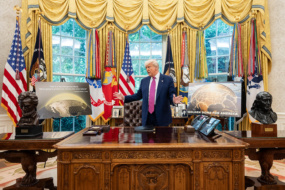It’s a big week on Capitol Hill this week for considering fiscal 2025 funding and priorities in the space realm.
Lawmakers are meeting three times this week to debate space policy:
- The House Armed Services Committee will mark up its draft of the fiscal 2025 National Defense Authorization Act on Wednesday.
- The Senate Appropriations Subcommittee on Commerce, Justice, Science, and Related Agencies will hear testimony on Thursday from NASA chief Bill Nelson on the agency’s fiscal 2025 budget.
- The House Appropriations Subcommittee on Transportation, House, and Urban Development will also hold a hearing Thursday on FAA funding in fiscal 2025.
Up first: Get your Rip Its ready—the marathon markup of the FY25 NDAA is tomorrow. Here’s our readout of some of the top space highlights from the draft bill, but the most contentious fight could come over transferring members of the Air Force National Guard who are conducting space missions into the Space Force. 140 House members, senators, and state officials—including all 50 governors—have come out against the proposal, according to Stars and Stripes.
Rep. Joe Wilson (R-SC) is one member of the House Armed Services Committee who has been leading the charge to stop the proposed transfers. Other lawmakers who have pushed back on the plan and who serve on the committee include Reps. Salud Carbajal (D-CA), Elissa Slotkin (D-MI) and Joe Courtney (D-CT).
On deck: Nelson typically has very congenial appearances on Capitol Hill, where he served for decades before becoming NASA administrator, and Thursday’s hearing at the Senate Appropriations subcommittee with some of his old colleagues is likely to be no exception.
If past is precedent, Nelson is likely to field questions about:
- China’s rise in space, and how NASA is competing with Beijing’s ambitious civil space goals
- The timeline for Artemis missions, and an update on NASA’s plan to return humans to the Moon’s surface
- The importance of NASA’s science budget, which has taken a hit in recent years
Lawmakers could also ask about delays in the Starliner program, which has had its first crewed flight delayed yet again until May 25, and the agency’s new plan for industry to pitch quicker and cheaper ways to return samples from Mars.
In the hole: FAA Administrator Michael Whitaker will also testify Thursday morning on the other side of Capitol Hill, appearing before the House Appropriations subcommittee. While the hearing isn’t space focused, the agency has some important space priorities that could get attention from senators.
The FAA requested $57B for fiscal 2025, a 36% increase from its fiscal 2024 funding level, to hire more people, develop expertise on human spaceflight for after the learning period ends (currently set for Jan. 1), and prepare to potentially take on added responsibilities if the White House’s mission authorization plan becomes law.
What’s next: On the authorization side, the NDAA is widely considered a “must-pass” bill that has a long track record of passing before the end of the calendar year.
The appropriations bills are likely facing a longer road. While committees are getting an early start in reviewing the agency’s proposals, the government is almost certain to begin the fiscal year under a continuing resolution that will last until after the presidential election.




